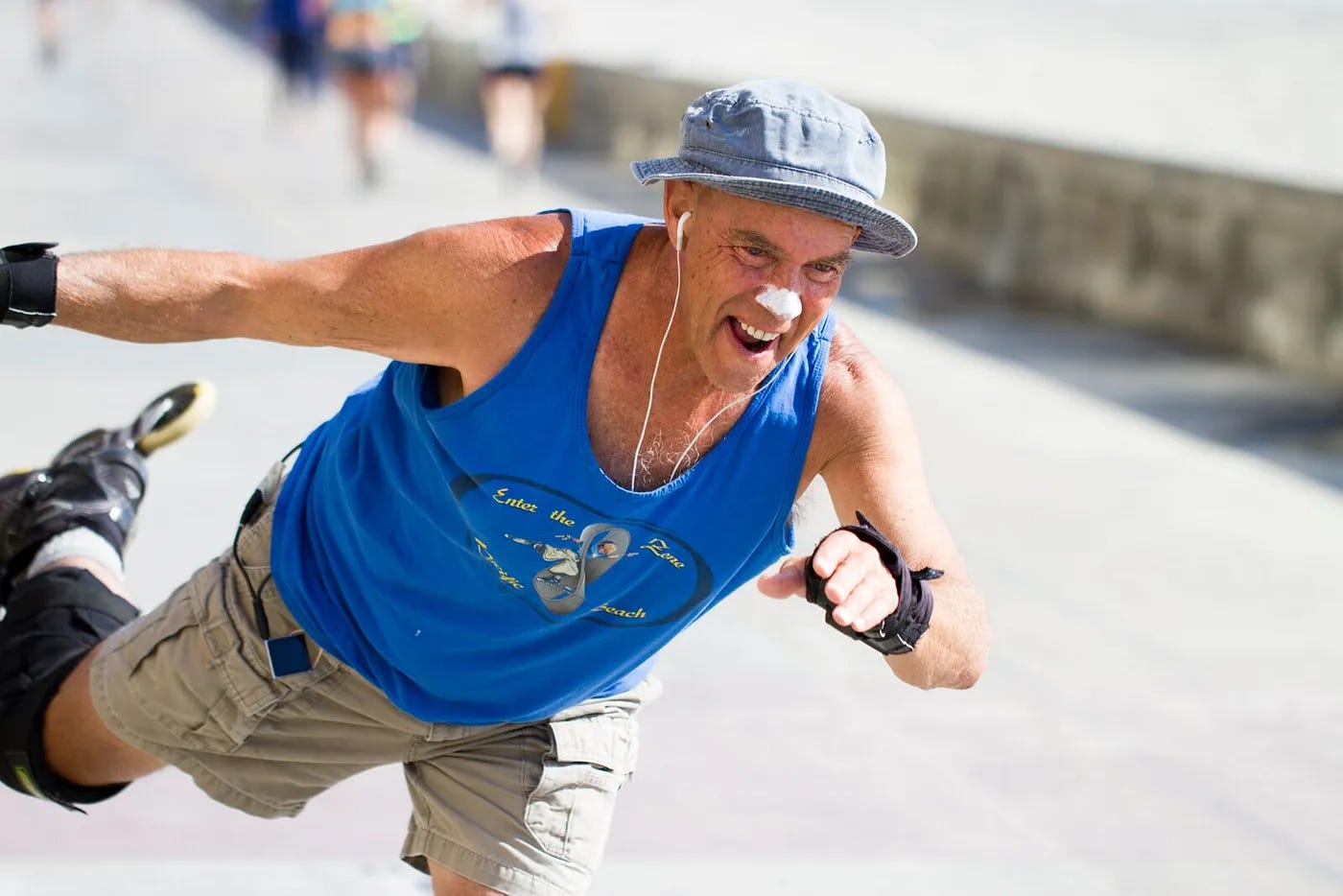You go, Cory Booker
Admiration for a senator’s feat of endurance is getting me through this week
Every big adventure has its comedown, and the fallout from my recent White Mountains 100 race has been a cold plunge. Painful? Yes. Refreshing. Maybe?
As soon as I limped home from a 34-hour life lived fully in my most cherished corner of the world and felt little to nothing about it — besides painfully swollen feet and a throbbing shin splint — I knew it was time to take a risk. Since my bout with COVID-19 initiated a strange mental shift two months ago, I have valued my easy state of emotional evenness. For two months, I’ve enjoyed an almost eerie inability to feel stress or anxiety. The mornings emerge in a pleasant, sun-dappled mist rather than a crushing doom fog. I can sleep as long as I want. My heart doesn’t collapse when I think of my father. But I recognize that the now-numbed grief was a reminder of how much I love him. Without that, what is left? And truly, the emotional detachment has gone too far. I can wage a soul-rending battle against pain and hypothermia in the Alaska wilderness, yet emerge with the same blasé attitude as a typical Tuesday afternoon. That’s just … not right. It’s time to reclaim some of the torment of being human.
I’m doing so in the best way I know how — tapering off the antidepressant that I believe saved me from plunging off the deep end in 2023. A week has passed since I cut my dose in half, and I’ve already returned to frequent sleep disruptions and crazy dreams of the sort I started having when I first embarked on this pharmaceutical journey. My psyche, though, is still dogged by numbness, pierced only by physical pain. The physical maladies aren’t nothing, though. Twice this week, my presence sparked mild but genuine alarm from health care professionals who have known me for years.
The first reaction came last Wednesday as I limped toward my physical therapist’s office. My shin was screaming after I’d dragged it around airports on Tuesday, but I thought I’d improved substantially since finishing the race. I was forcing an acceptable-if-slow gait. But my PT took one look at me and dug through her supplies for a pair of crutches and a cane. She demanded I employ these tools to take the weight off my left leg as much as possible while the strained, possibly torn, tibialis anterior muscle heals. I used the crutches for a few days. But they evoked too much attention at the grocery store, made it difficult to “walk” along a reservoir with my friends, and discouraged me from visiting my gym to do some of the few exercises I can do with a limpy leg. So I’m off my crutches and on a perceived fast track to healing through gentle use. We’ll see how blind optimism works for me.
On Monday, I returned to my allergist to resume immunotherapy shots for the first time in weeks. For much of this time, I’ve been dealing with a mysterious allergic reaction that causes swelling and a burning sensation around my eyes. The reaction started shortly after Beat and I returned from Switzerland in mid-February. The timing caused me to blame a cute but deadly Swiss cat that has proven particularly allergenic. But as the swelling persisted long after my last exposure to the cat, I had to concede it was something new. After the reaction disappeared while I was in Alaska, I had to guess that the cause was something in my house. It returned this week, just in time for my long-overdue shot.
The kid administering the shot said nothing about my face, so I assumed it wasn’t a big deal. But the nurse who checked my reaction a half hour later panicked when she saw me. “Did your eyes look like that before?” she gasped. This nurse has been a part of the allergy clinic since I became a patient eight and a half years ago; she’s the only person at the clinic — including my doctor — who regards me as though she knows me. The alarm on her face surprised me, and I sputtered as I tried to respond. She took this gurgling noise as proof that I was having difficulty breathing. I thought for sure she’d stab me with an EpiPen. But I managed to choke out an explanation that this reaction predated the shot, had been going on for weeks, and its cause was unknown.
The nurse still wouldn’t let me leave the clinic until I took an inhaler hit to get my breathing under control and promised I’d take the first doctor appointment she could send my way. She kept her word and got me in the next day, Tuesday morning. Of course, all the doctor could do was listen and refuse to commit to my theories, prescribe a few topical creams, agree with my hard no to taking prednisone, and schedule me for a contact allergy test that is probably going to cost a lot even after insurance. Sigh.
Driving home from the doctor’s office, I absent-mindedly clicked the radio to NPR — an old habit I try to avoid these days. Before I clicked away, I caught a booming voice assailing the devastating cuts to government agencies that protect everything I value in society: public lands, conservation, freedom of speech, freedom of movement, democracy, global cooperation, science, arts, health care, education … Yes, pretty much everything that makes life worth living in my country is being set up to be stripped down and sold for parts. From the news report, I learned of New Jersey Sen. Cory Booker’s marathon speech in the Senate. It would become a record-setting 25 hours of standing at the pulpit, preaching to the void without a single break for food or even a trip to the bathroom. He prepared for this by fasting and abstaining from water for several days — removing all need for bodily functions. Despite complete caloric depletion and dehydration, he displayed unflagging stamina as he gesticulated and roared for more than a day straight.
That kind of endurance makes my piddly hundred-mile snow slogs look tame. It makes any endurance feat I’ve admired in recent years look insignificant. As I listened to Senator Booker speak hoarsely but passionately in support of my most cherished values, my heart swelled with something that felt like …
Anger.
I was angry. So angry. All of the emotion that’s been blocked behind my artificial dam of tranquility broke through and flooded my amygdala, roiling into a white-hot rage. I don’t want this. I don’t want Rocky Mountain National Park to be strip-mined for rare earth minerals, and I don’t want to go to war with Canada, and I don’t want to contract a mutated form of measles, and I don’t want to breathe unregulated pollution, and I don’t want to be forced to censor myself, and I don’t millions of people to die for lack of US aid, and I don’t want any of it.
And yeah, yeah, if you don’t like something, do something about it. But you understand that a person like Cory Booker, a US senator with all of this power, can pull a brutally difficult and heroic stunt, and it likely won’t even make a dent in anything that’s happening. His marathon speech may rally some support from a demoralized public. But (gestures wildly at everything) is happening much too fast to move against it using conventional methods. And it’s being perpetuated by forces much larger and older than the current administration. When I get my emotions back, it’s probably just going to crush me again. We all want to carry the weight of the world. And we’re all trying to do it alone.
For that reason, or perhaps because it came up in one of my wacky Lexapro dreams, I’ve been thinking about SloMo. Way back in the Before Times, during a year when all I thought about was endurance racing and the book projects I was working on, and barely paid attention to anything else happening in the world — 2014 — I caught a New York Times documentary about SloMo. SloMo is the alter-ego of John Kitchin, who, in 2014, was a 70-year-old former neurologist who had spent the past fifteen years skating the same stretch of boardwalk on Pacific Beach in San Diego. He used an odd-looking technique of balancing on one leg for as long as possible, giving the appearance that he was skating in slow motion.
He wasn’t always this person. At the turn of the millennium, Dr. John Kitchin was a 55-year-old self-described “asshole” who measured his value against his income — and it was high. He admitted he likely would have stayed an asshole to the end of his days if it weren’t for a sudden blurring of his vision that ended his career. He was divorced. He had no hobbies. If he wasn’t a doctor, what even was he? He contemplated suicide until a random encounter in the hospital cafeteria. He met a 93-year-old man who came across as vibrant and full of life. When John asked him about the secret of vitality, the man replied, “Do what you want.”
That’s how John started skating. It was simple. It made him happy. He kept doing it. Skating up and down Pacific Beach. Every day. For fifteen years.
I blogged about the story, marveling at a person who could keep such a simple and yet profound commitment to Flow State. Flow State, also called “The Zone,” is a mental state in which a person is completely focused on a single task or activity. It’s our primal, truest path to happiness, for the simple reason that Flow keeps us anchored in the present where we belong. Most of us get caught up in future thinking: performance, image, rewards, earnings, and productivity. We live in a society where it’s ceased to feel meaningful to simply be alive. We need to be a cog in the machine, serving up arbitrary “value” that’s as ethereal as the dust we will all become. I marveled at SloMo’s ability to leave this behind for this one thing: a pursuit that’s as odd as it is capitalistically useless (although I’m sure all of the media to come out of his choice of retirement activity has produced its share of profits for somebody).
Holding up a beach bum as #lifegoals earned predictable pushback, including this comment exchange:
It’s interesting to return to this story 11 years later, with all of the aging I’ve done and “wisdom” I’ve acquired, with everything that’s happened in the interim, and still agreeing with my naive “Before Times” view: “He could have just as easily turned into a miserable old guy sitting on a couch alone in a giant mansion, screaming at talk radio and angry at the world. Privileged societies are full of this kind of lifelong misery. So yes, I do believe that people should spend a little less time thinking about what they need to do, and a little more time thinking about what they want to do.”
I think about my husband and me moving to the Alps, spending every day hiking. The world is burning, the country I love is disintegrating, the ailments of old age are probably coming for me sooner rather than later, and there is very little I can do about it. So why not? Why not be honest with myself? I don’t want to write a best-selling work of historical nonfiction. I don’t want recognition for my increasingly labored endurance efforts. The world doesn’t need this. I don’t need this. If I need to do something to survive or help my loved ones survive, I’ll pivot. I’m willing to do what it takes. My endurance is strong. Until then, I just want to hike in the mountains and be happy for as long as I’m gifted the privilege of being alive.
If only it were so simple. But then I Googled SloMo in 2025. He’s still alive. He’ll be 82 years old on April 7. And he’s still skating up and down Pacific Beach. Every single day. Last year, while celebrating his 81st birthday, California State Senator Catherine Blakespear presented John with a certificate of recognition for bringing peace and joy to the community.
“People have just gotten used to it – and I reckon that’s the main thing,” he said. “Live your life as much as you can, and do what you want to as much as you can. Once you secure your survival, do what you want to.”








Wonderful post, and as someone who's also done years of allergy shots, I have sympathy for you when it comes to figuring out when something new is happening.
One thing I think is interesting in your exchange from 11 years ago is that there was an admission that people assumed SloMo guy must either be a rich retiree or a homeless person. And then John's comment recently to "secure your survival and then do what you want." I think that the middle ground feels elusive for most people. If you're not willing to hashtag vanlife it or adopt tiny home living, and forgo most earthly possessions, then it feels like a bell curve. The people who are willing to sacrifice everything and the people who already have everything can do what they want. But for the vast majority of people who are in the middle of the curve reaching the "secure your survival" state can seem near impossible.
That's not an indictment on the idea of trying to focus more of living the life you want, but more an indictment on the society we live in that makes it damn near impossible to get out of survival mode for many people.
Hi Jill, thanks for this lovely, thoughtful post. One thought I had that might be helpful or might not: use Treking Poles instead of crutches. You get a lot of the same benefit as crutches in terms of taking weight off your legs but they have don't trigger the pity response in folks. It comes off as a fitness instead of therapy thing.